University Accounting Theory: Conceptual Framework Analysis - ACC301
VerifiedAdded on 2022/09/17
|8
|1329
|29
Homework Assignment
AI Summary
This assignment analyzes the revised conceptual framework for financial reporting finalized by the IASB. It addresses four key questions, examining the benefits and limitations of the conceptual framework, the objectives of general-purpose financial reporting, the concept of prudence (conservatism), and the principle of substance over form. The analysis delves into how these concepts impact financial statements, decision-making, and the interpretation of accounting standards. The assignment references relevant literature, including IFRS publications and academic studies, to support its arguments and provide a comprehensive understanding of the contemporary accounting issues discussed. The student also provides a video presentation summarizing the findings of the written report.
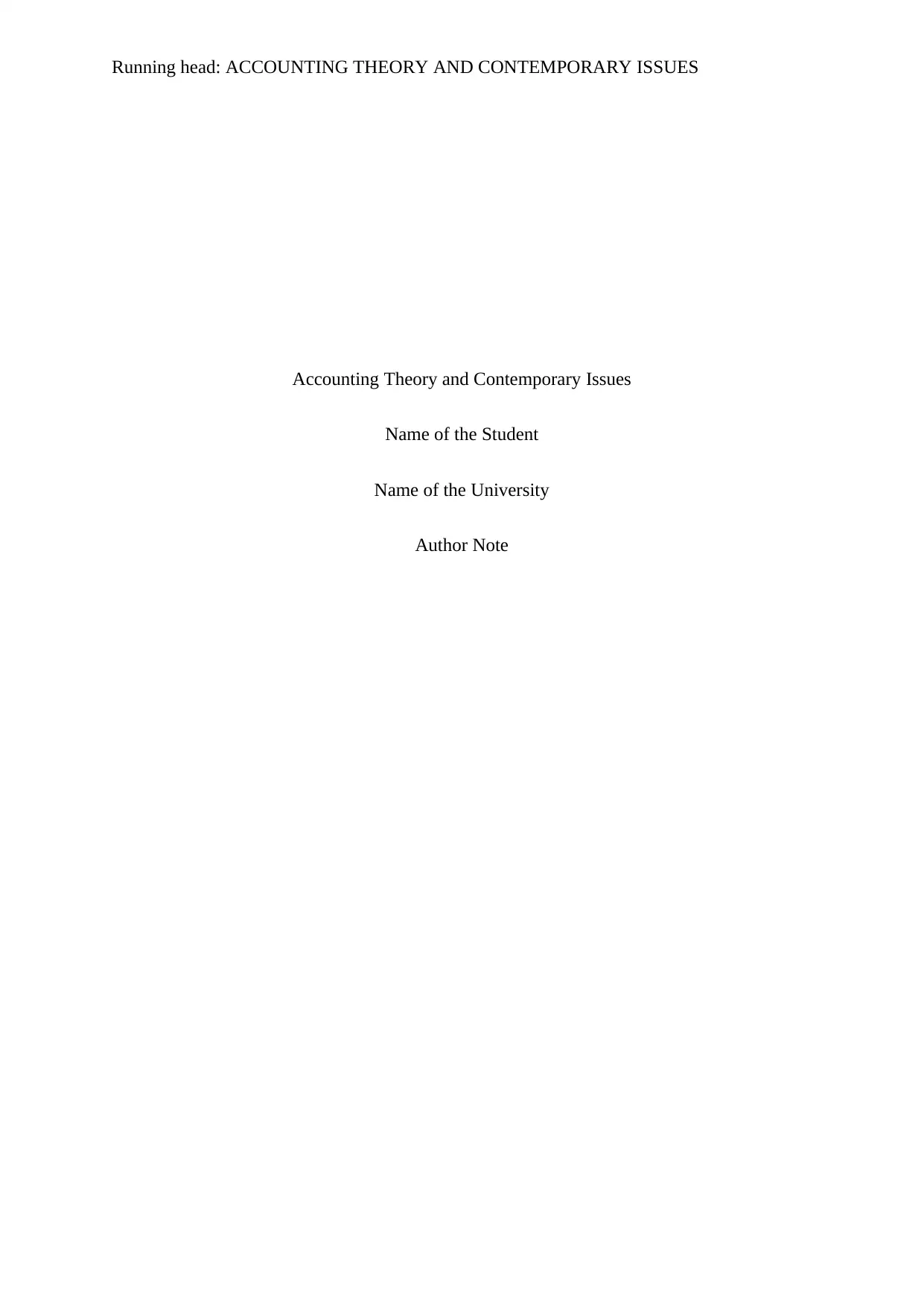
Running head: ACCOUNTING THEORY AND CONTEMPORARY ISSUES
Accounting Theory and Contemporary Issues
Name of the Student
Name of the University
Author Note
Accounting Theory and Contemporary Issues
Name of the Student
Name of the University
Author Note
Paraphrase This Document
Need a fresh take? Get an instant paraphrase of this document with our AI Paraphraser
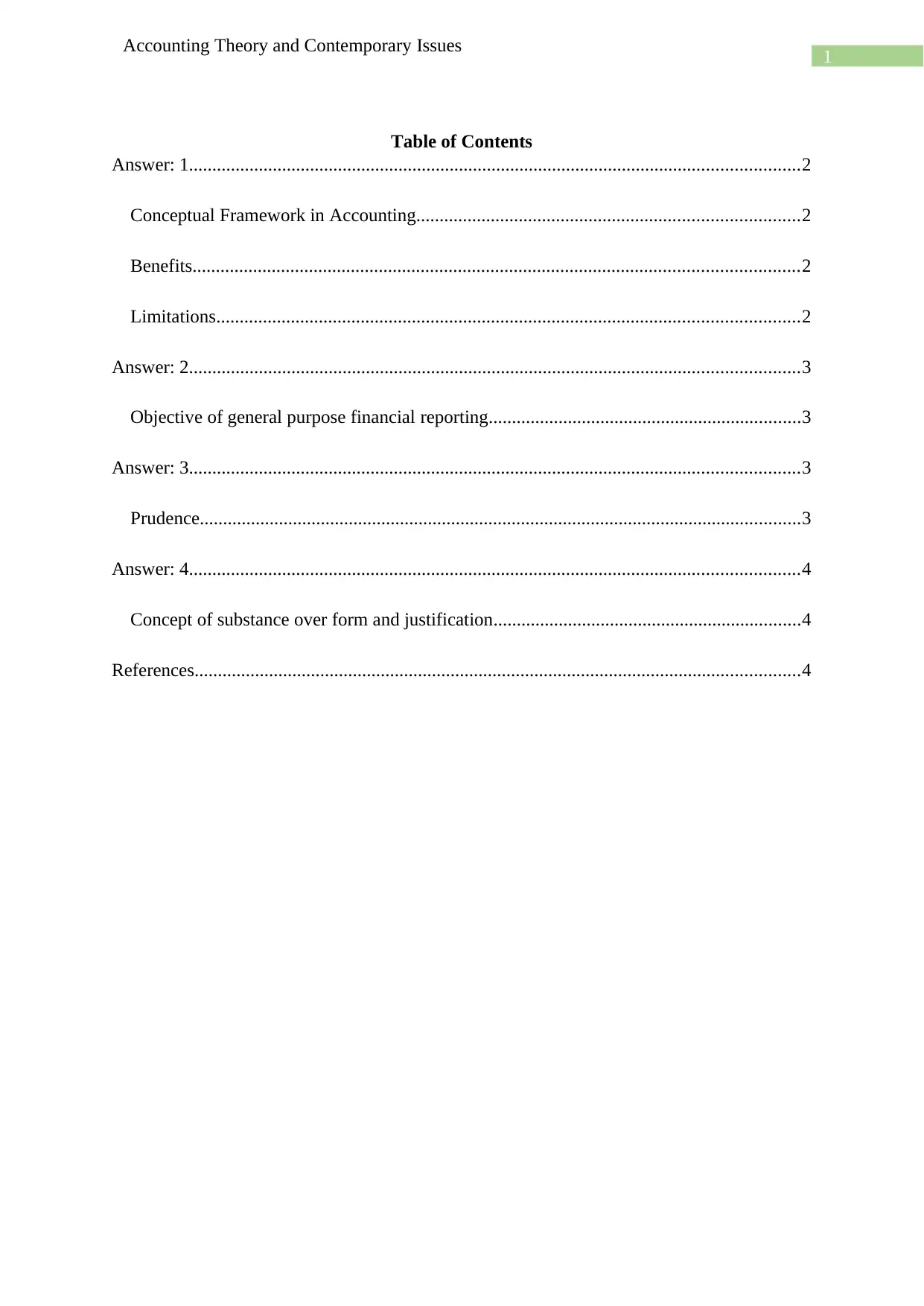
1
Accounting Theory and Contemporary Issues
Table of Contents
Answer: 1...................................................................................................................................2
Conceptual Framework in Accounting..................................................................................2
Benefits..................................................................................................................................2
Limitations.............................................................................................................................2
Answer: 2...................................................................................................................................3
Objective of general purpose financial reporting...................................................................3
Answer: 3...................................................................................................................................3
Prudence.................................................................................................................................3
Answer: 4...................................................................................................................................4
Concept of substance over form and justification..................................................................4
References..................................................................................................................................4
Accounting Theory and Contemporary Issues
Table of Contents
Answer: 1...................................................................................................................................2
Conceptual Framework in Accounting..................................................................................2
Benefits..................................................................................................................................2
Limitations.............................................................................................................................2
Answer: 2...................................................................................................................................3
Objective of general purpose financial reporting...................................................................3
Answer: 3...................................................................................................................................3
Prudence.................................................................................................................................3
Answer: 4...................................................................................................................................4
Concept of substance over form and justification..................................................................4
References..................................................................................................................................4
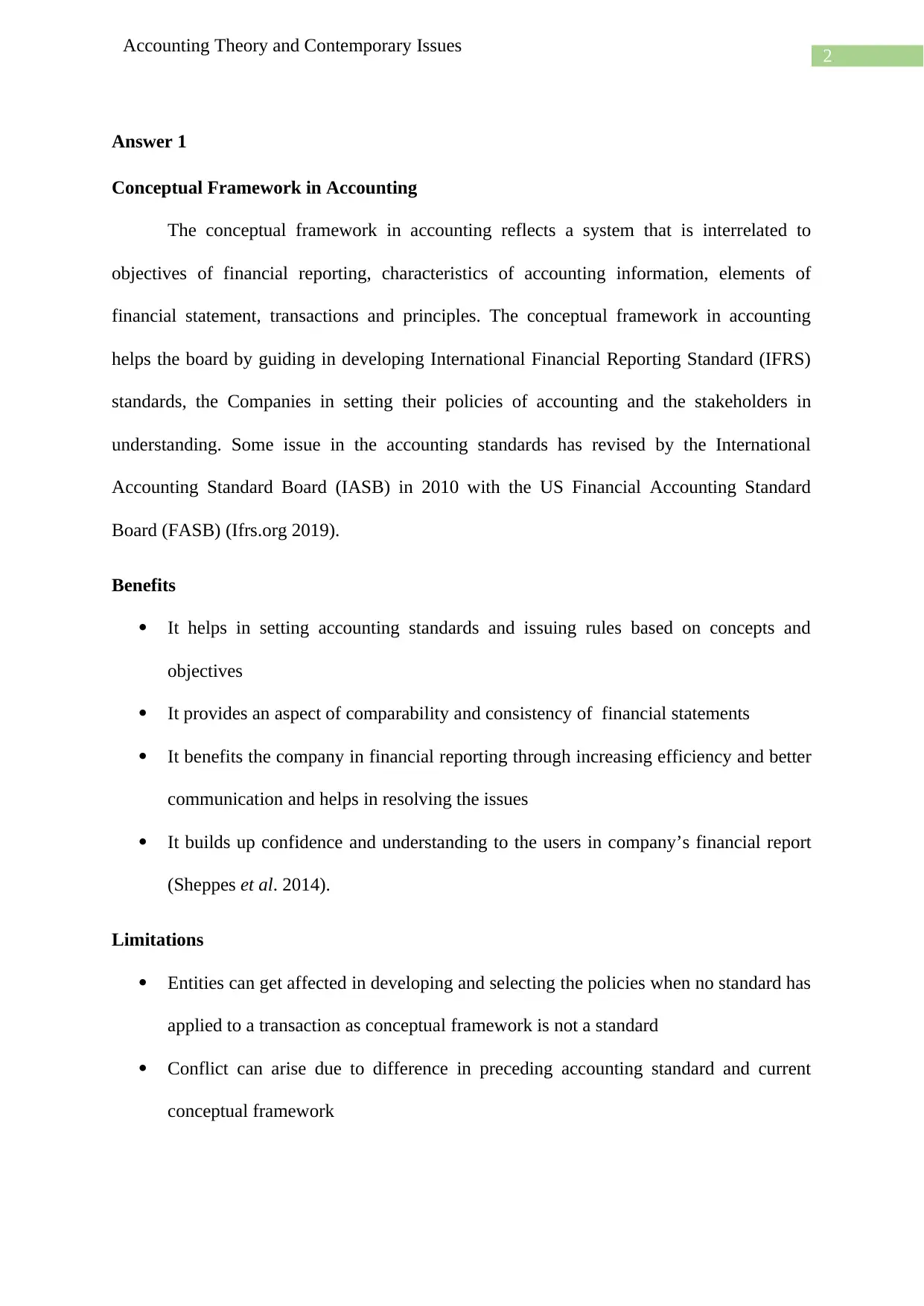
2
Accounting Theory and Contemporary Issues
Answer 1
Conceptual Framework in Accounting
The conceptual framework in accounting reflects a system that is interrelated to
objectives of financial reporting, characteristics of accounting information, elements of
financial statement, transactions and principles. The conceptual framework in accounting
helps the board by guiding in developing International Financial Reporting Standard (IFRS)
standards, the Companies in setting their policies of accounting and the stakeholders in
understanding. Some issue in the accounting standards has revised by the International
Accounting Standard Board (IASB) in 2010 with the US Financial Accounting Standard
Board (FASB) (Ifrs.org 2019).
Benefits
It helps in setting accounting standards and issuing rules based on concepts and
objectives
It provides an aspect of comparability and consistency of financial statements
It benefits the company in financial reporting through increasing efficiency and better
communication and helps in resolving the issues
It builds up confidence and understanding to the users in company’s financial report
(Sheppes et al. 2014).
Limitations
Entities can get affected in developing and selecting the policies when no standard has
applied to a transaction as conceptual framework is not a standard
Conflict can arise due to difference in preceding accounting standard and current
conceptual framework
Accounting Theory and Contemporary Issues
Answer 1
Conceptual Framework in Accounting
The conceptual framework in accounting reflects a system that is interrelated to
objectives of financial reporting, characteristics of accounting information, elements of
financial statement, transactions and principles. The conceptual framework in accounting
helps the board by guiding in developing International Financial Reporting Standard (IFRS)
standards, the Companies in setting their policies of accounting and the stakeholders in
understanding. Some issue in the accounting standards has revised by the International
Accounting Standard Board (IASB) in 2010 with the US Financial Accounting Standard
Board (FASB) (Ifrs.org 2019).
Benefits
It helps in setting accounting standards and issuing rules based on concepts and
objectives
It provides an aspect of comparability and consistency of financial statements
It benefits the company in financial reporting through increasing efficiency and better
communication and helps in resolving the issues
It builds up confidence and understanding to the users in company’s financial report
(Sheppes et al. 2014).
Limitations
Entities can get affected in developing and selecting the policies when no standard has
applied to a transaction as conceptual framework is not a standard
Conflict can arise due to difference in preceding accounting standard and current
conceptual framework
⊘ This is a preview!⊘
Do you want full access?
Subscribe today to unlock all pages.

Trusted by 1+ million students worldwide
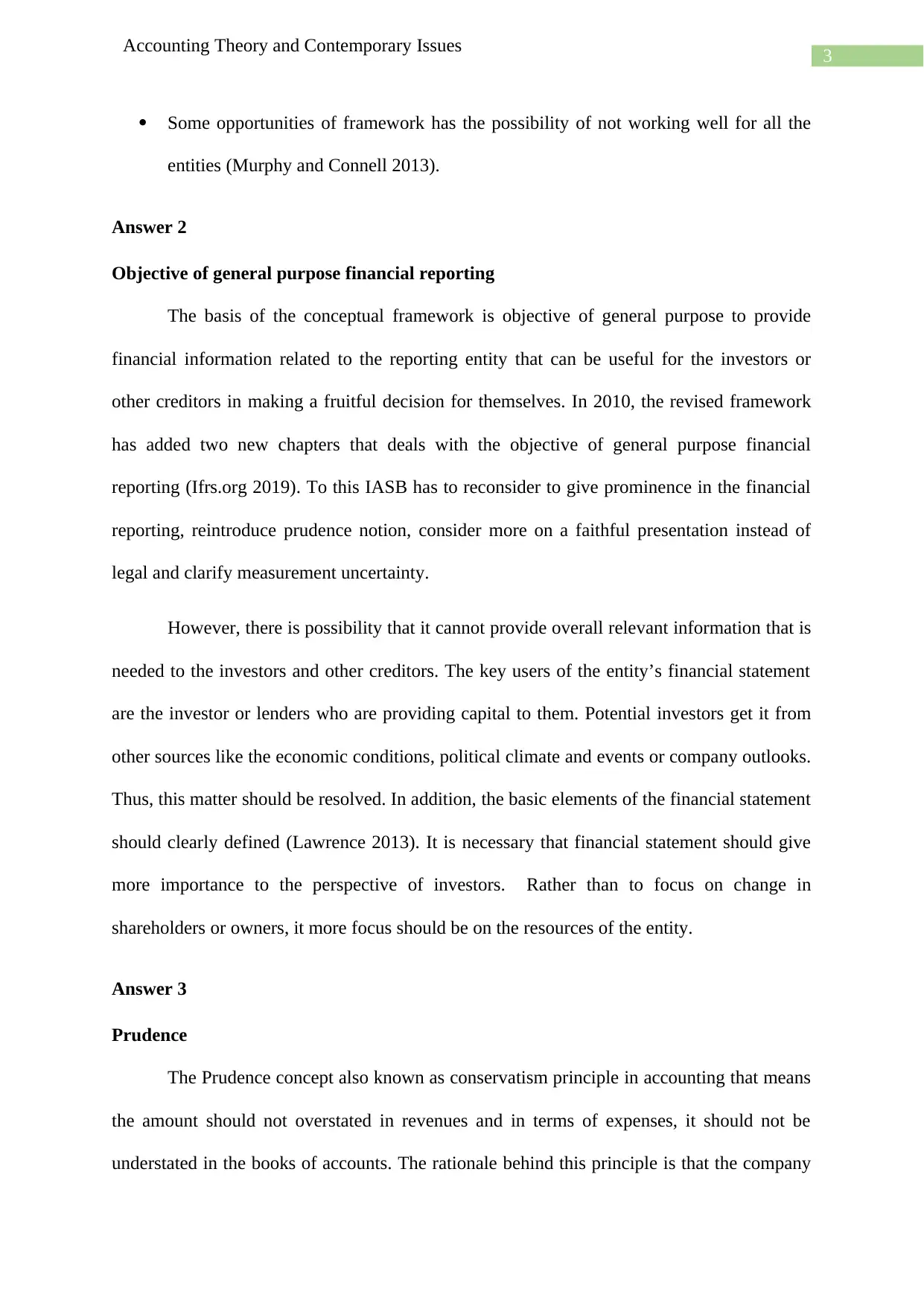
3
Accounting Theory and Contemporary Issues
Some opportunities of framework has the possibility of not working well for all the
entities (Murphy and Connell 2013).
Answer 2
Objective of general purpose financial reporting
The basis of the conceptual framework is objective of general purpose to provide
financial information related to the reporting entity that can be useful for the investors or
other creditors in making a fruitful decision for themselves. In 2010, the revised framework
has added two new chapters that deals with the objective of general purpose financial
reporting (Ifrs.org 2019). To this IASB has to reconsider to give prominence in the financial
reporting, reintroduce prudence notion, consider more on a faithful presentation instead of
legal and clarify measurement uncertainty.
However, there is possibility that it cannot provide overall relevant information that is
needed to the investors and other creditors. The key users of the entity’s financial statement
are the investor or lenders who are providing capital to them. Potential investors get it from
other sources like the economic conditions, political climate and events or company outlooks.
Thus, this matter should be resolved. In addition, the basic elements of the financial statement
should clearly defined (Lawrence 2013). It is necessary that financial statement should give
more importance to the perspective of investors. Rather than to focus on change in
shareholders or owners, it more focus should be on the resources of the entity.
Answer 3
Prudence
The Prudence concept also known as conservatism principle in accounting that means
the amount should not overstated in revenues and in terms of expenses, it should not be
understated in the books of accounts. The rationale behind this principle is that the company
Accounting Theory and Contemporary Issues
Some opportunities of framework has the possibility of not working well for all the
entities (Murphy and Connell 2013).
Answer 2
Objective of general purpose financial reporting
The basis of the conceptual framework is objective of general purpose to provide
financial information related to the reporting entity that can be useful for the investors or
other creditors in making a fruitful decision for themselves. In 2010, the revised framework
has added two new chapters that deals with the objective of general purpose financial
reporting (Ifrs.org 2019). To this IASB has to reconsider to give prominence in the financial
reporting, reintroduce prudence notion, consider more on a faithful presentation instead of
legal and clarify measurement uncertainty.
However, there is possibility that it cannot provide overall relevant information that is
needed to the investors and other creditors. The key users of the entity’s financial statement
are the investor or lenders who are providing capital to them. Potential investors get it from
other sources like the economic conditions, political climate and events or company outlooks.
Thus, this matter should be resolved. In addition, the basic elements of the financial statement
should clearly defined (Lawrence 2013). It is necessary that financial statement should give
more importance to the perspective of investors. Rather than to focus on change in
shareholders or owners, it more focus should be on the resources of the entity.
Answer 3
Prudence
The Prudence concept also known as conservatism principle in accounting that means
the amount should not overstated in revenues and in terms of expenses, it should not be
understated in the books of accounts. The rationale behind this principle is that the company
Paraphrase This Document
Need a fresh take? Get an instant paraphrase of this document with our AI Paraphraser
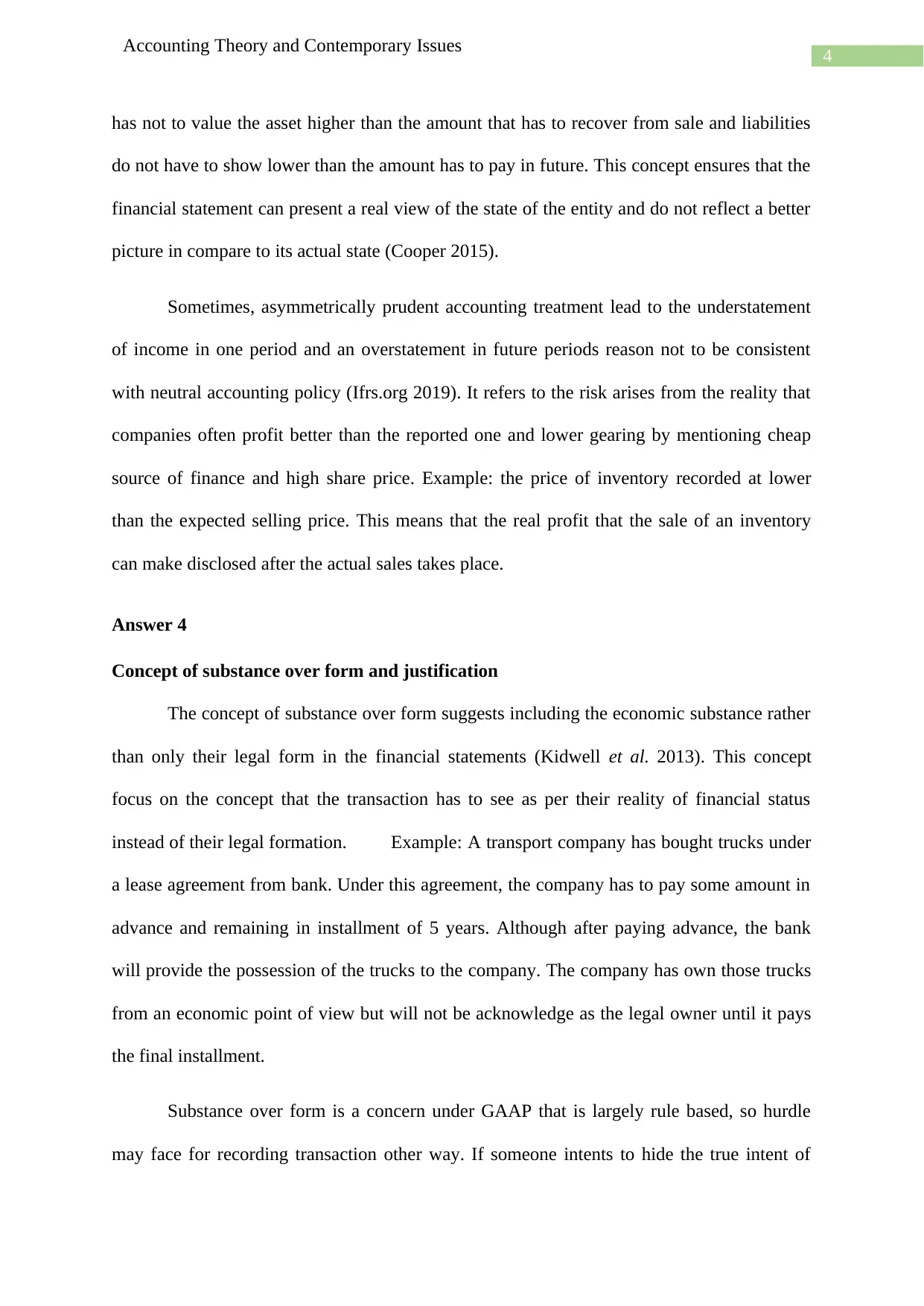
4
Accounting Theory and Contemporary Issues
has not to value the asset higher than the amount that has to recover from sale and liabilities
do not have to show lower than the amount has to pay in future. This concept ensures that the
financial statement can present a real view of the state of the entity and do not reflect a better
picture in compare to its actual state (Cooper 2015).
Sometimes, asymmetrically prudent accounting treatment lead to the understatement
of income in one period and an overstatement in future periods reason not to be consistent
with neutral accounting policy (Ifrs.org 2019). It refers to the risk arises from the reality that
companies often profit better than the reported one and lower gearing by mentioning cheap
source of finance and high share price. Example: the price of inventory recorded at lower
than the expected selling price. This means that the real profit that the sale of an inventory
can make disclosed after the actual sales takes place.
Answer 4
Concept of substance over form and justification
The concept of substance over form suggests including the economic substance rather
than only their legal form in the financial statements (Kidwell et al. 2013). This concept
focus on the concept that the transaction has to see as per their reality of financial status
instead of their legal formation. Example: A transport company has bought trucks under
a lease agreement from bank. Under this agreement, the company has to pay some amount in
advance and remaining in installment of 5 years. Although after paying advance, the bank
will provide the possession of the trucks to the company. The company has own those trucks
from an economic point of view but will not be acknowledge as the legal owner until it pays
the final installment.
Substance over form is a concern under GAAP that is largely rule based, so hurdle
may face for recording transaction other way. If someone intents to hide the true intent of
Accounting Theory and Contemporary Issues
has not to value the asset higher than the amount that has to recover from sale and liabilities
do not have to show lower than the amount has to pay in future. This concept ensures that the
financial statement can present a real view of the state of the entity and do not reflect a better
picture in compare to its actual state (Cooper 2015).
Sometimes, asymmetrically prudent accounting treatment lead to the understatement
of income in one period and an overstatement in future periods reason not to be consistent
with neutral accounting policy (Ifrs.org 2019). It refers to the risk arises from the reality that
companies often profit better than the reported one and lower gearing by mentioning cheap
source of finance and high share price. Example: the price of inventory recorded at lower
than the expected selling price. This means that the real profit that the sale of an inventory
can make disclosed after the actual sales takes place.
Answer 4
Concept of substance over form and justification
The concept of substance over form suggests including the economic substance rather
than only their legal form in the financial statements (Kidwell et al. 2013). This concept
focus on the concept that the transaction has to see as per their reality of financial status
instead of their legal formation. Example: A transport company has bought trucks under
a lease agreement from bank. Under this agreement, the company has to pay some amount in
advance and remaining in installment of 5 years. Although after paying advance, the bank
will provide the possession of the trucks to the company. The company has own those trucks
from an economic point of view but will not be acknowledge as the legal owner until it pays
the final installment.
Substance over form is a concern under GAAP that is largely rule based, so hurdle
may face for recording transaction other way. If someone intents to hide the true intent of
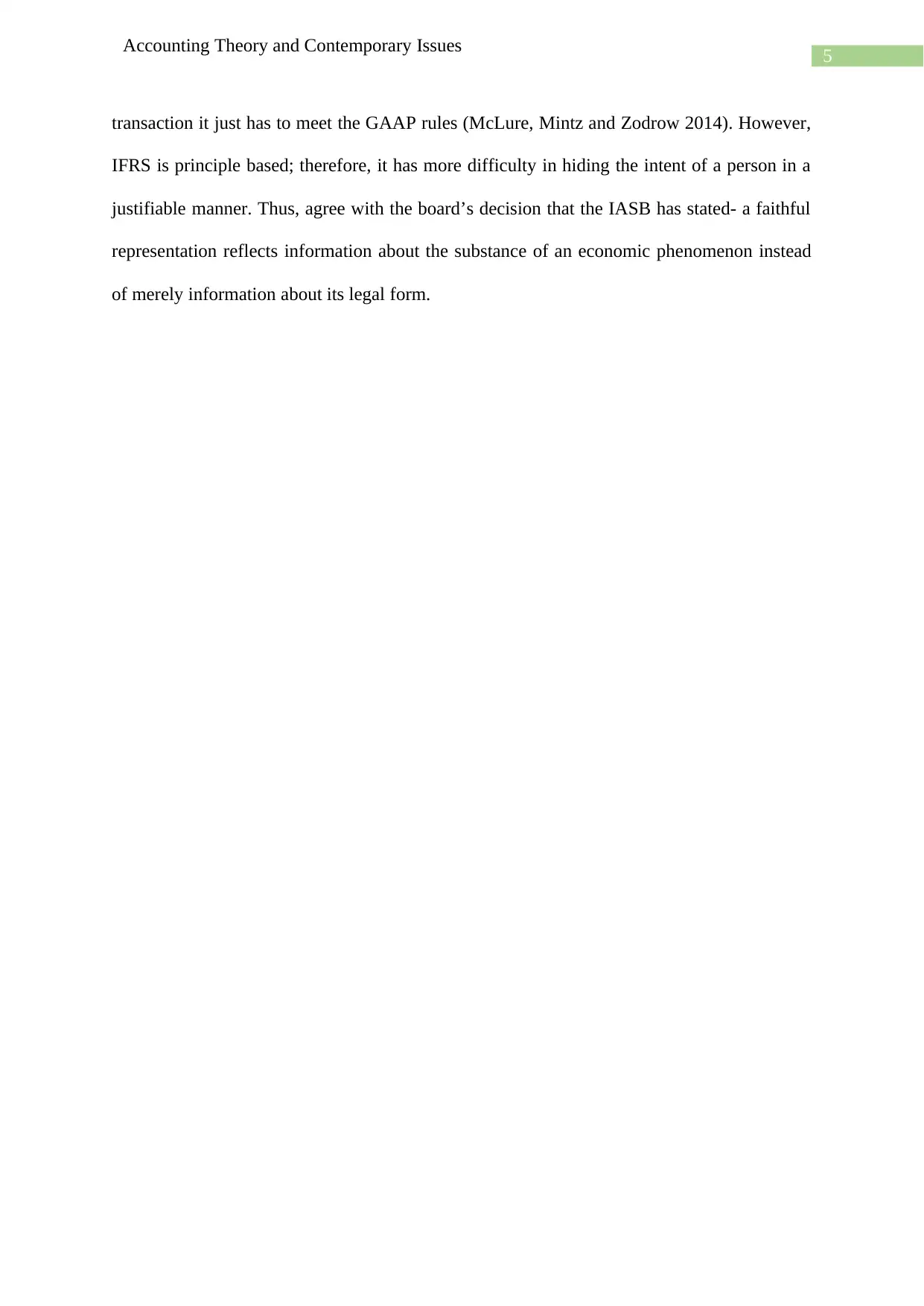
5
Accounting Theory and Contemporary Issues
transaction it just has to meet the GAAP rules (McLure, Mintz and Zodrow 2014). However,
IFRS is principle based; therefore, it has more difficulty in hiding the intent of a person in a
justifiable manner. Thus, agree with the board’s decision that the IASB has stated- a faithful
representation reflects information about the substance of an economic phenomenon instead
of merely information about its legal form.
Accounting Theory and Contemporary Issues
transaction it just has to meet the GAAP rules (McLure, Mintz and Zodrow 2014). However,
IFRS is principle based; therefore, it has more difficulty in hiding the intent of a person in a
justifiable manner. Thus, agree with the board’s decision that the IASB has stated- a faithful
representation reflects information about the substance of an economic phenomenon instead
of merely information about its legal form.
⊘ This is a preview!⊘
Do you want full access?
Subscribe today to unlock all pages.

Trusted by 1+ million students worldwide
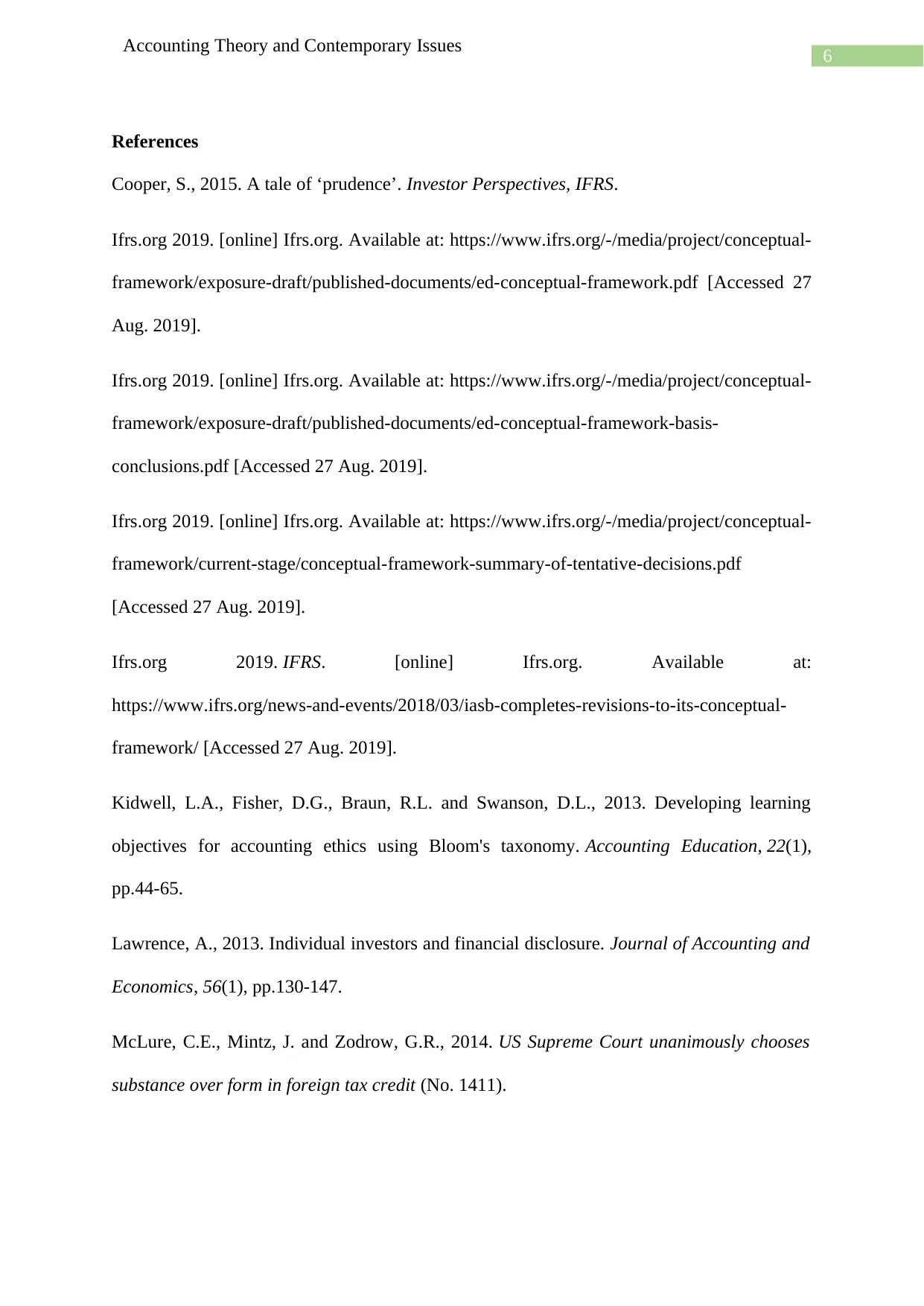
6
Accounting Theory and Contemporary Issues
References
Cooper, S., 2015. A tale of ‘prudence’. Investor Perspectives, IFRS.
Ifrs.org 2019. [online] Ifrs.org. Available at: https://www.ifrs.org/-/media/project/conceptual-
framework/exposure-draft/published-documents/ed-conceptual-framework.pdf [Accessed 27
Aug. 2019].
Ifrs.org 2019. [online] Ifrs.org. Available at: https://www.ifrs.org/-/media/project/conceptual-
framework/exposure-draft/published-documents/ed-conceptual-framework-basis-
conclusions.pdf [Accessed 27 Aug. 2019].
Ifrs.org 2019. [online] Ifrs.org. Available at: https://www.ifrs.org/-/media/project/conceptual-
framework/current-stage/conceptual-framework-summary-of-tentative-decisions.pdf
[Accessed 27 Aug. 2019].
Ifrs.org 2019. IFRS. [online] Ifrs.org. Available at:
https://www.ifrs.org/news-and-events/2018/03/iasb-completes-revisions-to-its-conceptual-
framework/ [Accessed 27 Aug. 2019].
Kidwell, L.A., Fisher, D.G., Braun, R.L. and Swanson, D.L., 2013. Developing learning
objectives for accounting ethics using Bloom's taxonomy. Accounting Education, 22(1),
pp.44-65.
Lawrence, A., 2013. Individual investors and financial disclosure. Journal of Accounting and
Economics, 56(1), pp.130-147.
McLure, C.E., Mintz, J. and Zodrow, G.R., 2014. US Supreme Court unanimously chooses
substance over form in foreign tax credit (No. 1411).
Accounting Theory and Contemporary Issues
References
Cooper, S., 2015. A tale of ‘prudence’. Investor Perspectives, IFRS.
Ifrs.org 2019. [online] Ifrs.org. Available at: https://www.ifrs.org/-/media/project/conceptual-
framework/exposure-draft/published-documents/ed-conceptual-framework.pdf [Accessed 27
Aug. 2019].
Ifrs.org 2019. [online] Ifrs.org. Available at: https://www.ifrs.org/-/media/project/conceptual-
framework/exposure-draft/published-documents/ed-conceptual-framework-basis-
conclusions.pdf [Accessed 27 Aug. 2019].
Ifrs.org 2019. [online] Ifrs.org. Available at: https://www.ifrs.org/-/media/project/conceptual-
framework/current-stage/conceptual-framework-summary-of-tentative-decisions.pdf
[Accessed 27 Aug. 2019].
Ifrs.org 2019. IFRS. [online] Ifrs.org. Available at:
https://www.ifrs.org/news-and-events/2018/03/iasb-completes-revisions-to-its-conceptual-
framework/ [Accessed 27 Aug. 2019].
Kidwell, L.A., Fisher, D.G., Braun, R.L. and Swanson, D.L., 2013. Developing learning
objectives for accounting ethics using Bloom's taxonomy. Accounting Education, 22(1),
pp.44-65.
Lawrence, A., 2013. Individual investors and financial disclosure. Journal of Accounting and
Economics, 56(1), pp.130-147.
McLure, C.E., Mintz, J. and Zodrow, G.R., 2014. US Supreme Court unanimously chooses
substance over form in foreign tax credit (No. 1411).
Paraphrase This Document
Need a fresh take? Get an instant paraphrase of this document with our AI Paraphraser
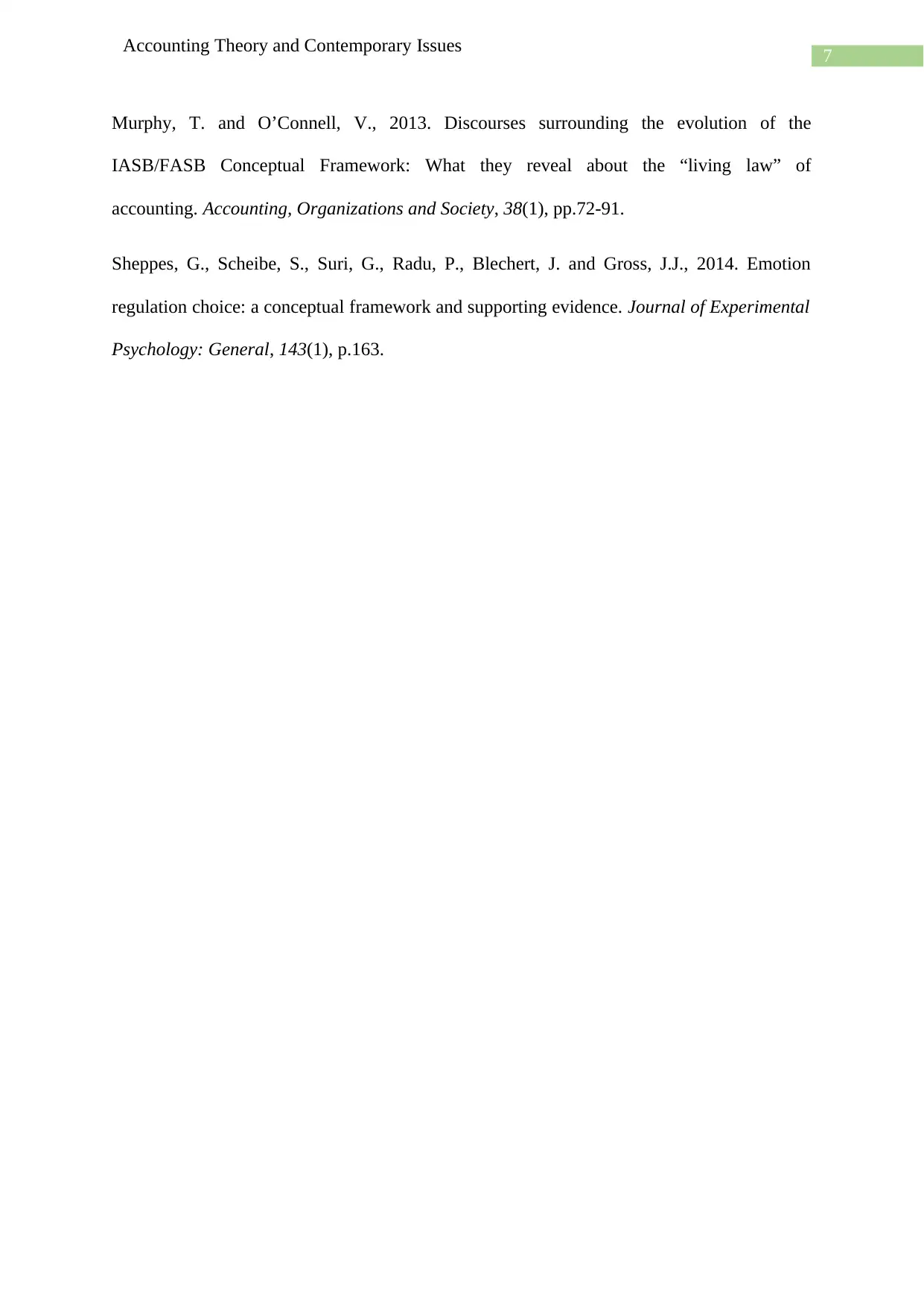
7
Accounting Theory and Contemporary Issues
Murphy, T. and O’Connell, V., 2013. Discourses surrounding the evolution of the
IASB/FASB Conceptual Framework: What they reveal about the “living law” of
accounting. Accounting, Organizations and Society, 38(1), pp.72-91.
Sheppes, G., Scheibe, S., Suri, G., Radu, P., Blechert, J. and Gross, J.J., 2014. Emotion
regulation choice: a conceptual framework and supporting evidence. Journal of Experimental
Psychology: General, 143(1), p.163.
Accounting Theory and Contemporary Issues
Murphy, T. and O’Connell, V., 2013. Discourses surrounding the evolution of the
IASB/FASB Conceptual Framework: What they reveal about the “living law” of
accounting. Accounting, Organizations and Society, 38(1), pp.72-91.
Sheppes, G., Scheibe, S., Suri, G., Radu, P., Blechert, J. and Gross, J.J., 2014. Emotion
regulation choice: a conceptual framework and supporting evidence. Journal of Experimental
Psychology: General, 143(1), p.163.
1 out of 8
Related Documents
Your All-in-One AI-Powered Toolkit for Academic Success.
+13062052269
info@desklib.com
Available 24*7 on WhatsApp / Email
![[object Object]](/_next/static/media/star-bottom.7253800d.svg)
Unlock your academic potential
Copyright © 2020–2026 A2Z Services. All Rights Reserved. Developed and managed by ZUCOL.





